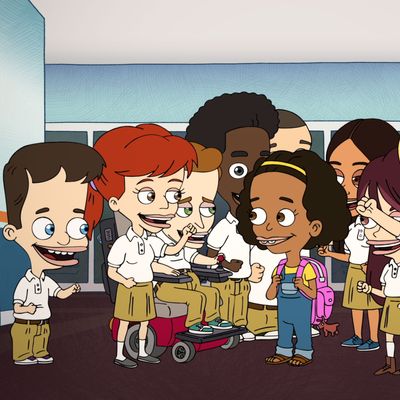
In its animated portrait of kids navigating the choppy waters of puberty, Big Mouth has focused largely on the sexual aspects of coming of age. During its initial two seasons, the Netflix series tackled menstruation, masturbation, questions about sexual orientation, body image, and the stress of first kisses and ugly breakups. In its newly dropped third season, the series is still operating in that same hormonal middle-school milieu. One episode offers a tutorial on vibrators, along with some encouraging words from a vagina voiced by Kristen Wiig. In all of the episodes, there is an abundance of jokes about boners, orgasms, and various sexual activities, including having sex with roast turkeys, obviously. But the latest season also addresses the broader change that happens when kids reach puberty: how they start to shed their childhood selves and adopt new identities. In its story lines and its genre-hopping approach to season three, Big Mouth the series goes through its own version of that same process.
The Netflix series, created by Nick Kroll, Andrew Goldberg, Mark Levin, and Jennifer Flackett, has shown an interest in experimentation before. It staged a few musical numbers in its first two seasons and in this year’s Valentine’s Day special. Season two’s Planned Parenthood episode, with its sexual-health-themed sketches, was a terrific diversion from the usual. But season three throws tonal and stylistic curveballs even more frequently.
There are more musical sequences, including an anti-slut-shaming pop song called “Slut Walk,” a hair-metal-style salute to the many “great” things about the state of Florida, and an episode largely devoted to a middle-school production of a musical based on the 1994 erotic thriller Disclosure. There’s a road trip episode in which Nick (Kroll) joins Andrew (John Mulaney) and his family on a spring break trip to visit Andrew’s grandfather in Florida. Another is a full half-hour biopic about Duke Ellington, narrated by the ghost of Duke Ellington who lives in Nick’s attic. The season finale unfolds like a teen superhero show on the CW, and we’re not sure until almost the end to what extent it’s a full-on fantasy.
It’s as if Big Mouth has reached an age where it wants to try on different personas just to see how they fit — which is also what happens to most people during their preteen years. Yes, the hormonal changes make you unpredictably horny and rage-y and sensitive, as Big Mouth has made clear on numerous occasions. But puberty is also the human equivalent of molting. Kids shed the skins they’ve been wearing since kindergarten and start to look for different ones to wear. They push boundaries —note: this is why it’s hard to parent preteens — and they seek new experiences. Some of them are the sexual kind. But some of them are not.
To a greater extent than it has before, Big Mouth season three follows its characters on both those kinds of journeys. We see Matthew (Andrew Rannells) embark on his first real romantic relationship with a gay peer. We watch as everyone flips their lid when Ali (Ali Wong), a new student, announces she’s pansexual. We watch Jay (Jason Mantzoukas) come out as bisexual, Jessi (Jessi Klein) become more comfortable with the idea of female pleasure, Andrew engage in a thoroughly misguided dalliance with his cousin, and innocent, overalls-wearing Missy (Jenny Slate) start to present a sexier side of herself. But we witness other transformations, too. Jay spends some time living with Nick and his family, and begins to understand what it feels like to exist in a (relatively) normal home with supportive, attentive parents. Nick goes to Florida with Andrew and realizes that Florida sounds better in theory than it actually is, a universal rite of passage. Overwhelmed by the implications of a major standardized test, several of the main characters start taking Adderall to improve their performance, an idea that also sounds better in theory than it actually is.
The most significant developments, though, are the ones that unfold in the final moments of the season, as seventh grade comes to a close. (Note: Major spoilers ahead.) Jessi finds out she and her mom will be moving to the city, which means she won’t be attending Bridgeton Middle for eighth grade. In the fallout of a brief romance between Nick and Missy, who is both Andrew’s ex and current girlfriend of Lars (Neil Casey), the relationships between all four fall apart. Missy swears off communicating with all three boys. Deeply hurt by Nick’s betrayal, Andrew tells him they can no longer be friends, severing the relationship that is the core of Big Mouth.
This is another thing that happens in the pubescent years: You grow apart from friends you thought you’d have for life. Sometimes that shift is temporary and friends find each other again. Sometimes it isn’t and they don’t. By ending with these connections having been ruptured, Big Mouth shatters its own foundation, delivering a very sad cliffhanger. It’s a testament to this show that we feel so heartbroken for these kids. We know because we’ve been there.
That’s what makes Big Mouth such a great coming-of-age story. It’s not just the raunchy humor and brilliant one-liners, although those are also exceptional. (I’m still laughing at the comment that Connie, Maya Rudolph’s Hormone Monstress, makes about the development of hot-or-not lists at Bridgeton: “Ranking girls makes you feel powerful, like a BuzzFeed freelancer.”) This is a show that understands and depicts puberty in all its uncomfortable shades and colors. It gets how awkward it is that your body constantly plays practical jokes on you at that age. But it also captures how painful it is at that age to constantly adjust to shifts you can’t control, inside yourself and out. Growing up pushes you aggressively into new situations. Growing up hurts. Big Mouth season three doesn’t let you forget it.





